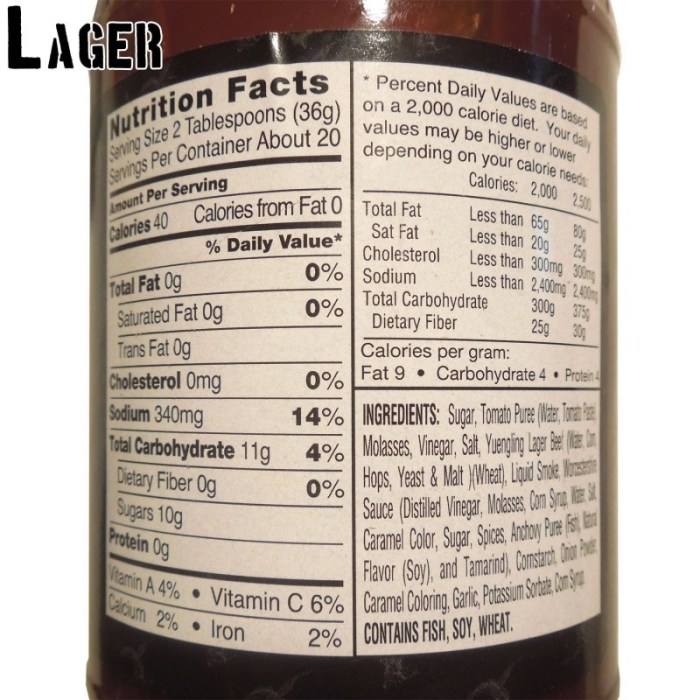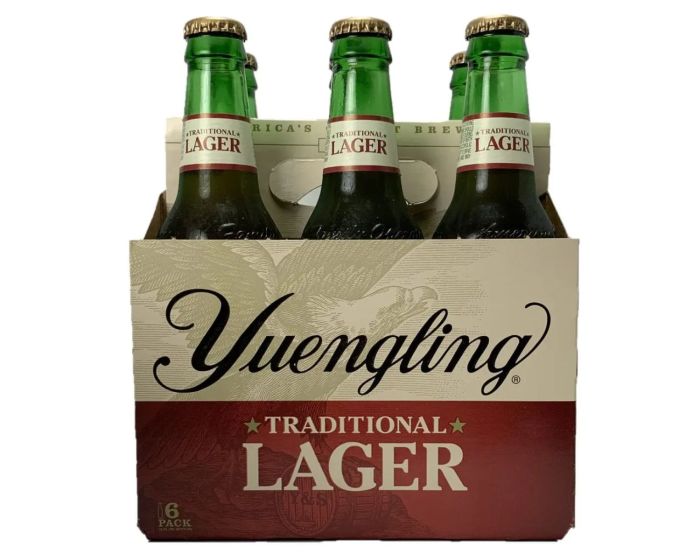Nutritional Content Overview: Nutrition Facts Of Yuengling Lager

Nutrition facts of yuengling lager – Yo, Jogja peeps! Let’s get real about those Yuengling Lager nutrition facts. We’re not here to preach about health, but knowing what’s in your brew is always a good vibe. This breakdown gives you the lowdown on the nutritional content, so you can enjoy your beer responsibly. Remember, moderation is key, guys!
| Serving Size | Calories | Macronutrients | Micronutrients |
|---|---|---|---|
| 12 fl oz (355 ml) | 150-160 | Carbohydrates (13g), Protein (1g), Fat (0g) | Information varies and isn’t always consistently reported on labels. Often negligible. |
Carbohydrate Content
The carbohydrate content in a typical serving of Yuengling Lager is around 13 grams. This primarily comes from the fermentation of grains during the brewing process, resulting in simple sugars. While the exact breakdown of sugar types isn’t always readily available on the label, it’s safe to assume that the majority is made up of simple sugars like maltose and glucose, which are quickly absorbed by the body.
Fat Content, Nutrition facts of yuengling lager
Yuengling Lager, like most beers, contains virtually no fat. The fat content is negligible, usually listed as 0 grams per serving. This means there’s no significant contribution of saturated, unsaturated, or trans fats to consider.
A comparative analysis of Yuengling Lager’s nutritional profile reveals a high carbohydrate content, typical of many lagers. This contrasts sharply with the often-lower caloric density of other condiments; for instance, one might consider the significantly different nutritional makeup presented by nutrition facts for light ranch dressing , a popular choice often paired with heavier foods. Ultimately, understanding the nutritional data of both the beer and the dressing provides a fuller picture of the overall caloric intake of a meal.
Protein Content
A 12-ounce serving of Yuengling Lager provides approximately 1 gram of protein. While this amount is relatively small compared to other protein sources, it’s still worth noting. This protein comes from the grains used in brewing and is primarily composed of amino acids. While not a significant source of protein in a diet, it does contribute a tiny amount.
Comparison with Other Beers

Yo, Jogja peeps! Let’s get real about those lager calories. We’ve looked at Yuengling, but how does it stack up against other popular American lagers? This ain’t just about getting buzzed; it’s about understanding what you’re putting in your body.
Comparing nutritional profiles helps us make informed choices. We’ll check out calorie counts, carbs, alcohol content, and even some micronutrients (the tiny stuff that’s still important!). This comparison will help you see where Yuengling fits in the bigger picture of American lager choices.
Nutritional Comparison of American Lagers
The following table compares Yuengling Lager to a few other popular American lagers. Remember, these values can vary slightly depending on the source and brewing batch. Always check the label on the specific beer you’re drinking for the most accurate information.
| Beer | Calories (per 12 oz) | Carbohydrates (per 12 oz) | Alcohol by Volume (ABV) |
|---|---|---|---|
| Yuengling Lager | 140-160 | 10-13g | 4.2% |
| Budweiser | 145 | 10g | 5% |
| Miller Lite | 96 | 3g | 4.2% |
| Coors Light | 102 | 5g | 4.2% |
Note: The nutritional information provided above is approximate and may vary depending on the source and brewing batch. Always refer to the label on the specific beer for the most accurate information.
Similarities and Differences in Macronutrients
As you can see from the table, there are some similarities and differences in the macronutrient profiles of these lagers. Budweiser and Yuengling are relatively close in terms of calories and carbs, while Miller Lite and Coors Light are significantly lower in both. The ABV is fairly consistent across these examples, sitting around 4-5%. This means the difference in calories and carbs is largely due to the ingredients and brewing process.
Micronutrient Variations
Unfortunately, detailed micronutrient information isn’t always readily available on beer labels. However, it’s safe to say that the micronutrient content of these beers is likely minimal. Beers primarily provide calories, carbohydrates, and alcohol; they are not significant sources of vitamins and minerals. Any micronutrients present would likely come from the ingredients used in brewing, such as hops and barley, but in relatively small quantities.
Nutritional Advantages and Disadvantages of Yuengling Lager
Compared to the light beers (Miller Lite and Coors Light), Yuengling Lager has more calories and carbohydrates. This might be considered a disadvantage for those watching their weight or carbohydrate intake. However, compared to Budweiser, Yuengling is relatively similar in terms of calories and carbs, so it doesn’t stand out as particularly high or low in those areas. Ultimately, the “advantage” or “disadvantage” depends entirely on your individual dietary goals and preferences.
Question & Answer Hub
Does Yuengling Lager contain gluten?
Yes, Yuengling Lager contains gluten due to the use of barley in its brewing process.
Are there any significant differences in the nutritional content between Yuengling Lager and other lagers?
Nutritional profiles vary across different beer brands and styles. Comparisons should consider factors such as brewing methods, ingredient variations, and alcohol content.
How does Yuengling Lager impact individuals with diabetes?
Individuals with diabetes should consume Yuengling Lager, and alcoholic beverages in general, in moderation due to its carbohydrate content and potential impact on blood sugar levels. Consultation with a healthcare professional is recommended.
What are the long-term health risks associated with excessive Yuengling Lager consumption?
Excessive alcohol consumption is linked to various health problems, including liver disease, cardiovascular issues, and increased cancer risk. Moderation is key to minimizing these risks.
